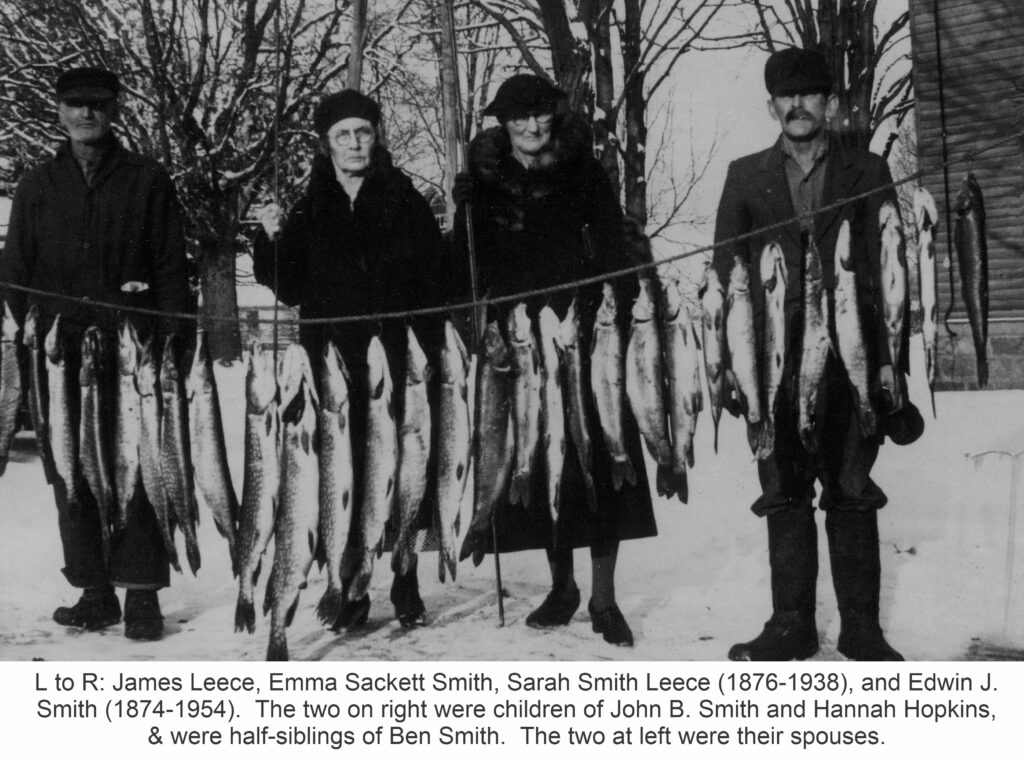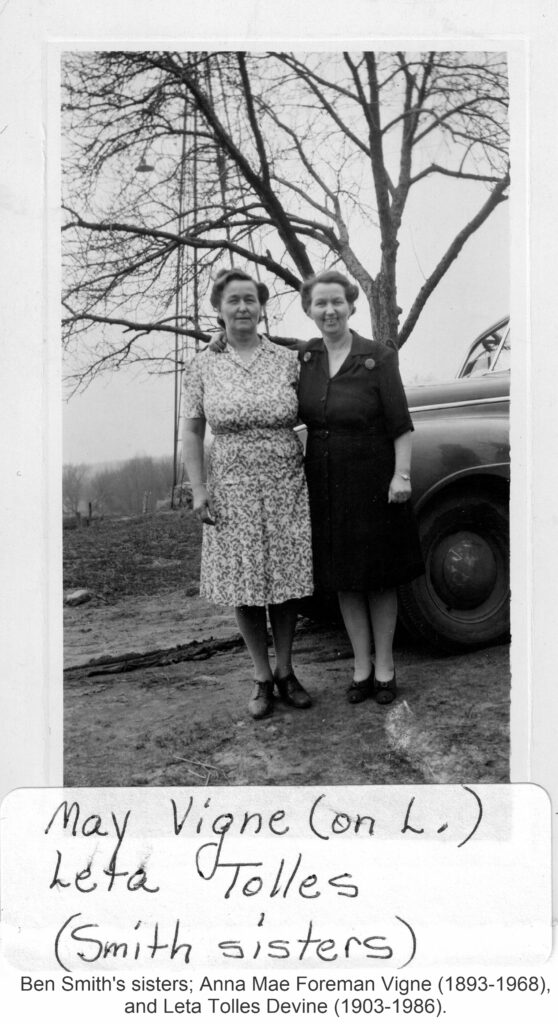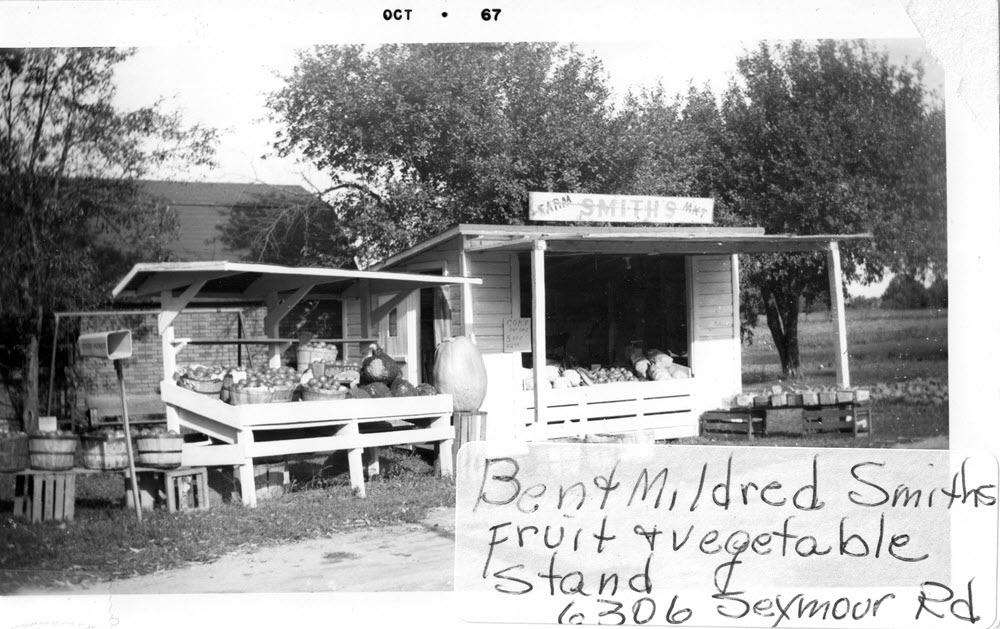Profile of Benjamin Fred Smith, born 1898 at Munith, Michigan, died 1969 at Gainesville, Florida
When Ben Smith was born in May 1898, his parents and two older sisters lived in or near Munith, Michigan, in Jackson county. His mother, Anna Barr Smith, was John B. Smith’s second wife. (See the profile of John B. Smith in “John B. Smith Family Report”). When Ben was born, his oldest half-brother Edwin was nearly 25, and his half-sister Sarah, 22, was already married. Only Susie, 10 or 11, from that family was at home, as was John and Anna’s first child, (Anna) May, born in 1894.
John B. Smith was a carpenter, and supported the family at least in part by building barns. I think he also clerked in a Munith store during the winters. Little Ben attended with his sister May the Dewey School, a one-room school about 3 miles east of Munith.
Sometime between 1907 and 1910 the family moved to a house and 25 acres on the corner of Bunkerhill Rd and Hawkins Rd, about 3 miles north of the current State prison. This was much closer to the city of Jackson than Munith, and Ben would later find work in Jackson for many years. Still a boy when they moved, Ben attended the Southwell school a mile north of his house. His education ended when he graduated from the 8th grade (at age 14?); normal for most kids at that time.
Ben’s father died when Ben was 18. His mother, Anna, remarried, but died just three years later, when Ben was 21. I don’t know what Ben did for a living in his late teens and early 20s, or where he lived.
In 1919, at the age of 21, Ben married Hazel Mary Clouse, and in 1920 their daughter Leta Wanda Smith was born. The 1920 census shows the three as boarders in the City of Jackson (their street is indecipherable), and his occupation was “house carpenter”, working for a contractor. The marriage soon ended in a 1922 divorce, but I believe Leta would remain, at least part of the time, in Ben’s family after he remarried in 1928. Leta was apparently named after Ben’s younger sister Leta.
I’m not certain where Ben lived in the 1920s, but he apparently was working in shops in Jackson. There was a lot of manufacturing in Jackson then. At some point he became a welder, and I think he held welding jobs until 1935 or 1936.
Apparently Ben, like so many Michigan men, learned to hunt and fish at an early age. We have a photo from the mid-20s of Ben with his shotgun standing proudly next to his Chevy, with several pheasants lined up on the fender. I also recall seeing a photo of his Indian motorcycle, and a photo of him with his company league baseball team. In about 1929 Ben played for Ampco Twist, where he was a welder. Their games were at the Jackson Fairgrounds. Phyllis Bungart recalled that when she was growing up, the family often had fish for dinner. Ben would work all day on the farm, then dig up some worms and go fishing for a couple of hours at Brills Lake. He also frequently went ice fishing in the winter.
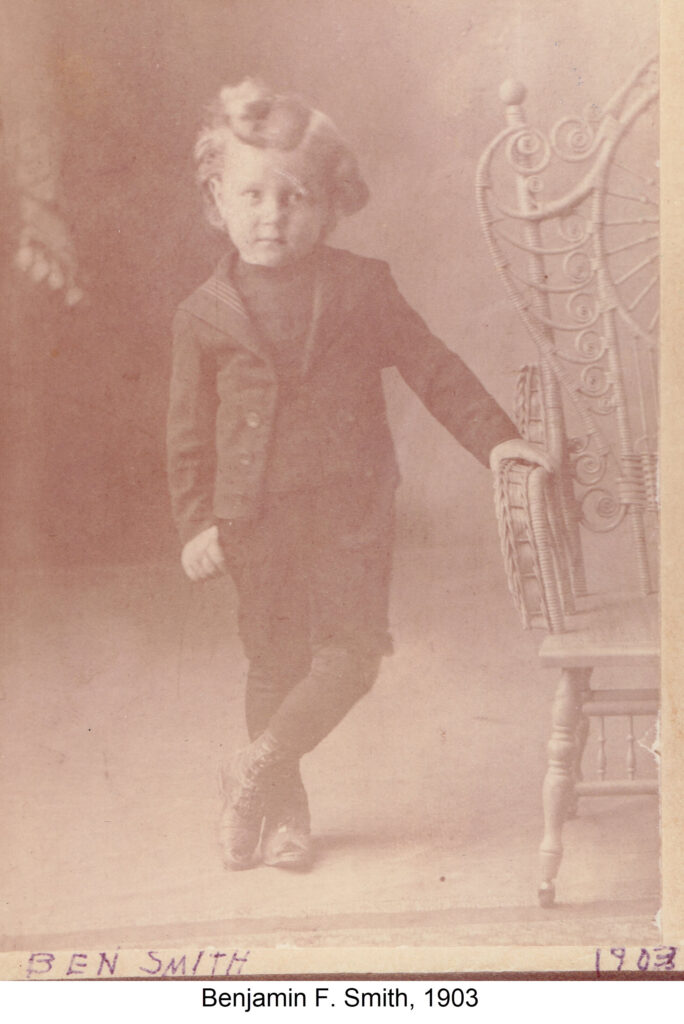
One story I recall from when Ben was a very young man, was that another man was standing on a ladder above Ben, using an axe, when he dropped the axe. Ben’s nose was cut off completely. Fortunately the other guy had the presence of mind to wrap the nose in ice, and when they arrived at the hospital, the surgeons were able to sew Ben’s nose back on.
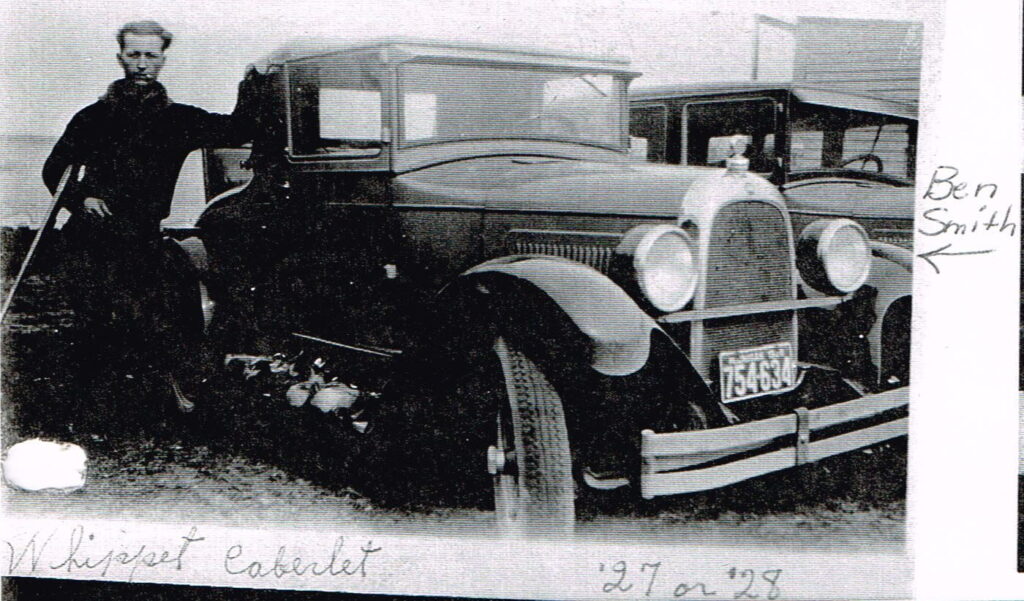
After he built his cabin at Lake Paradise in 1958, about seven miles south of Mackinac Bridge, Ben, on their short vacations there, would go out in his boat to fish every morning at dawn. He brought far more fish, mostly blue-gills, home than he and Mildred could possibly eat, and shared them with Phyllis’ family, as well as others. During the Fall deer season, he usually headed for Northern Michigan to hunt.
I believe that he began losing his hearing as a young man. My recollection of him, when he was in his 60s, was that he was mostly deaf, and could not really carry on a conversation, even with his hearing aid. I recall that my mother (Ben’s daughter) said that when she was growing up at home, he was mostly deaf, and he communicated very little. His deafness had a big impact on his personality and behavior. I remember him, from when I was a boy and he was in his 60s, as gruff and somewhat distant because of the difficulty of communicating.
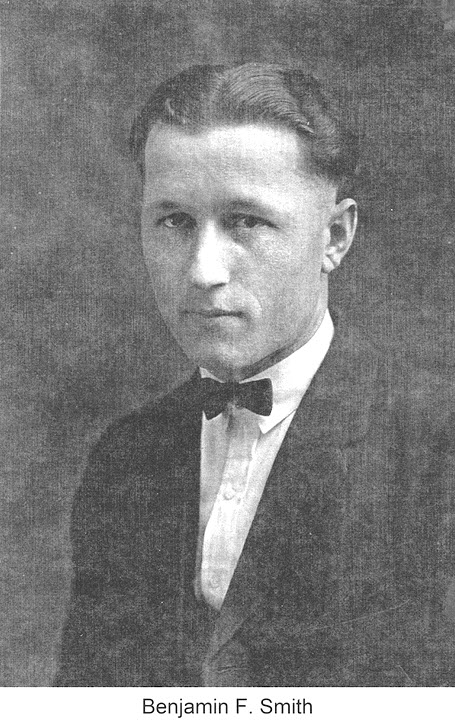
In 1927 or 1928 Ben met Mildred Wolfe (called “Mid”). Mildred had returned from South Bend, Indiana, where she had lived with girlfriends and worked in a hotel. In Jackson she moved in with her older sister Nell and Nell’s husband Russell Borton, and took a waitress job at the brand new Hayes Hotel. It must have paid well because she bought a new Chevrolet Cabriolet in June 1927 for about $700. Very few women bought cars in the 1920s, and not many even learned to drive.
Ben and Mildred married in 1928, and in May 1929 their daughter Phyllis was born. The new family lived first at 119 E. South St., and Ben worked at Ampco Twist Drill Company. By 1931 they were living at 2225 Vining Street, in the southeast area of Jackson, and Ben was a welder at Reynolds Spring Co. I think they continued to live at that Vining St. address until 1936, which I believe was an apartment building.
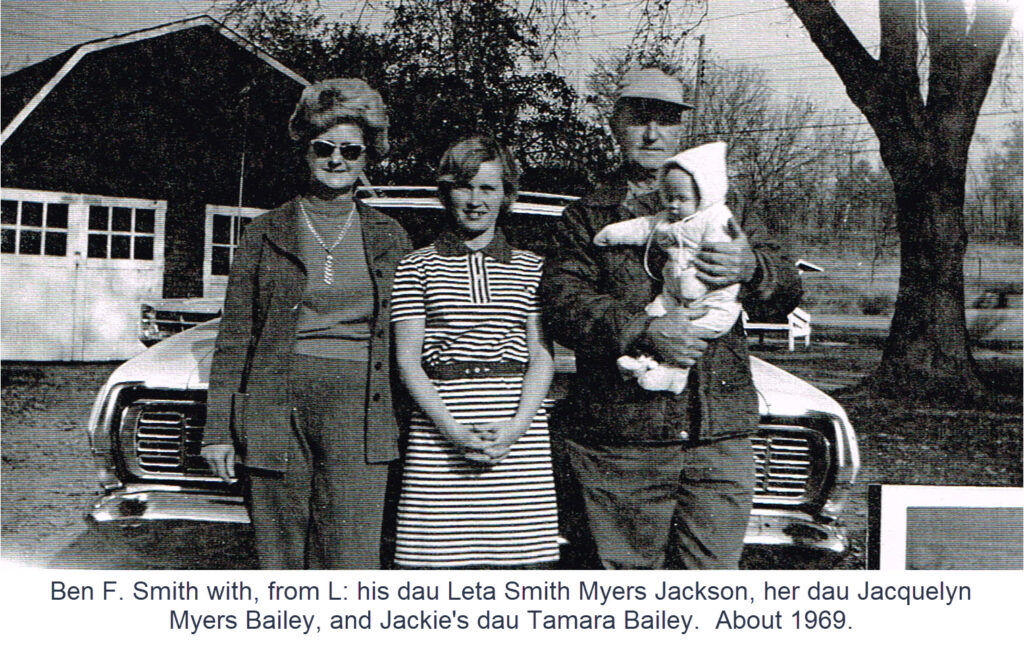
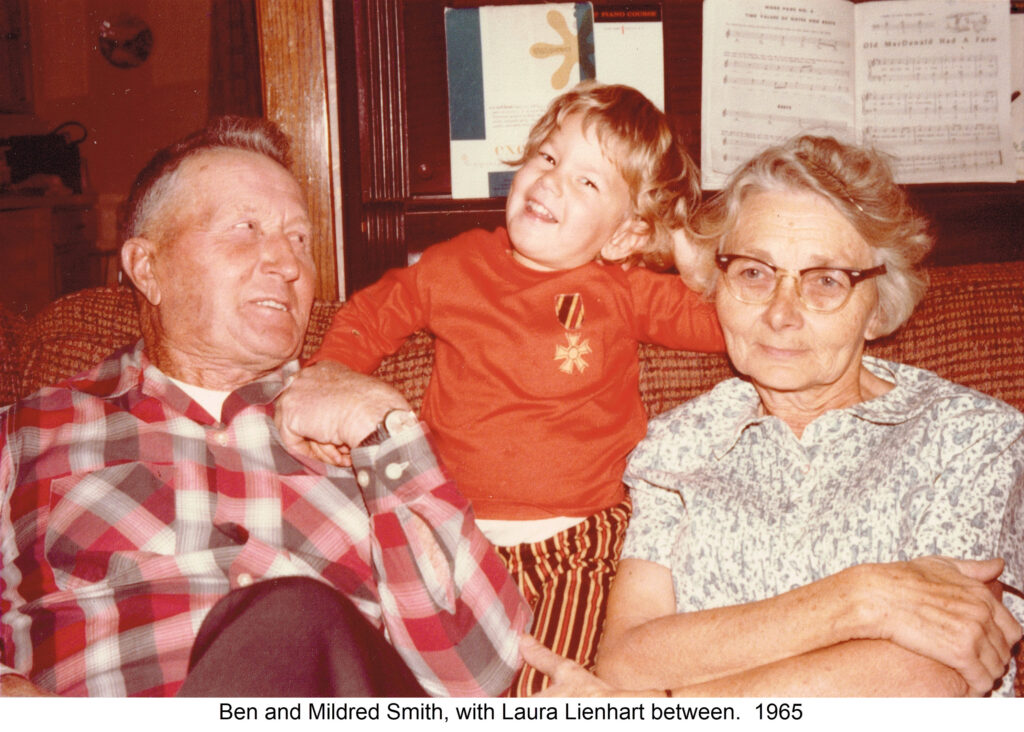
In Spring 1936, at the low point of the Great Depression, Ben, 38 years old now, changed careers. He borrowed $600 from his sister May and her husband Clyde Forman at 5%, and bought a very small farm on Seymour Road, northeast of Jackson. I think the total cost was $900. I imagine that manufacturing in Jackson was fairly dead in the ’30s, and welding jobs, or any other shop jobs, were impossible to find. Instead, Ben would use the skills he learned as a boy to get started in ‘truck’ farming. He would grow produce (vegetables) to wholesale to Jackson grocery stores. That required far less land than raising animals or grain; the practice of nearly all Michigan farmers. Growing produce was basically gardening on a large scale, requiring intensive hand labor. In the 1930s money was scarce, and local people often bought goods and services with barter rather than with money. By producing food, Ben always had a valuable commodity with which to trade.
He bought a team of horses for the power he needed for plowing and other working of the soil, replacing them with a Farmall Model ‘A’ tractor in the early ’40s. His daughter Phyllis wrote, “He not only did our farming but plowed Victory gardens for people in Jackson. He had a plow mounted on the tractor and carried a small drag on a trailer behind. At every stop he would pull the drag off and on by himself. There would be some weekends I would drive the tractor from place to place and he would follow in the car. I would be so embarrassed to think someone I knew from school might see me. He would plow a garden plot and drag it for no less than $10, no matter how small. The price went up from there according to the size. Victory gardens were very popular during the war. It became the IN thing to grow your own vegetables. People who had never gardened wanted a plot plowed. We ran ads in the Jackson Citizen Patriot newspaper for several years. Years later, Daddy still made a trip each Spring to dedicated customers to plow their gardens. He paid for this first tractor that way. He went on to own two more Model “A” Farmalls; both bought new.”
With no sons big enough yet to help him (his only son, Philip, was born in 1932, and they then had no more children), he relied on his wife and little daughter for extra hands. Phyllis said once that she never learned much about cooking or laundry or other domestic duties when she was growing up because her role, outside school, was to help her dad in the fields. When she got married she needed a lot of coaching from her mother and mother-in-law on how to be a housewife.
Because of his deafness, Ben rarely used the telephone. If he had to answer the phone, the calling party would have to repeatedly shout into it for Ben to decipher a simple message. In his late 60s, Ben and Mildred were told by a doctor that a surgical fix for his condition had been discovered. He tried it, on just one ear, and the result was miraculous. I recall my mom’s astonishment when her father called her at home one day, just to chat. It may have been the first ‘normal’ conversation she had ever had with him.
I believe it was in the late 1950s that Ben and Mildred began going to Florida in the winter. They liked the Gulf side of the state; Sarasota and then Englewood. It started with fairly short stays there, and then grew to longer stays, and they upgraded from a trailer to a full mobile home. As I recall, one of their early mobile homes was wrecked in a hurricane when they were away, but they replaced it. Ben liked to fish, which I think he did from the docks. When in Michigan in Spring through Fall, Ben and Mid would sometimes escape the farm to their cottage in Northern Michigan.
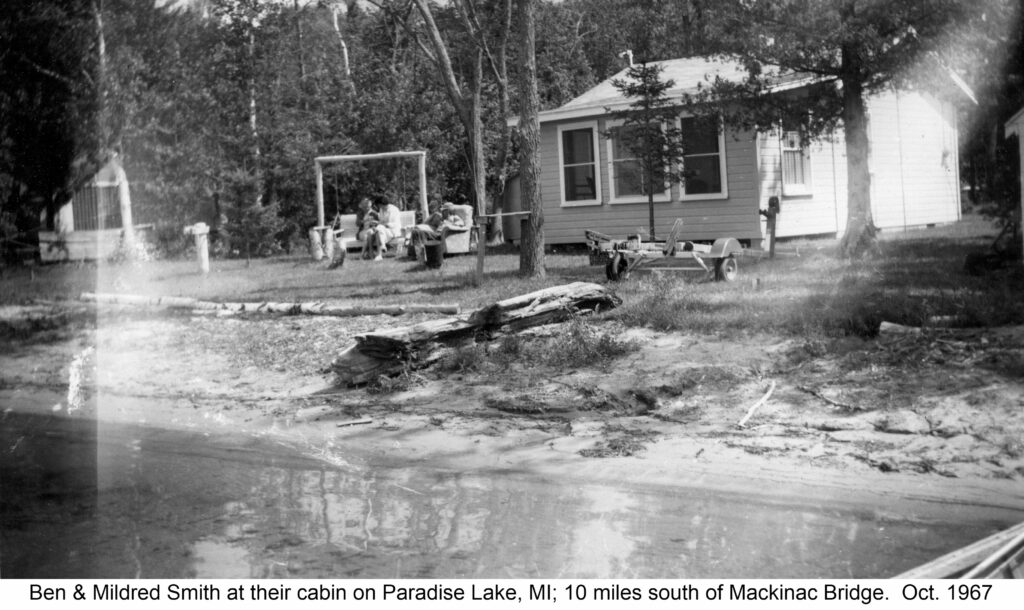
Besides wholesaling produce, they operated a roadside stand next to the house. I remember sitting in it when a child in the 60s. Ben or Mildred ran the stand themselves, and people from Jackson often drove out to buy fresh produce. Phyllis wrote about her mother that, “one of her summer jobs was tending the stand, and anything she did she had to keep an eye on the stand. If it was evening or Sundays Flip & I could be there. Daddy liked one of us to be there with him as he was so hard of hearing.”
When Ben turned 65 years old in 1963, I think he began collecting Social Security benefits. Either because he no longer needed as much income, or because of restrictions on income imposed by the Social Security administration, he reduced the scale of his farming operation and his workload.
On 15 November 1969, making their annual trip to their mobile home in Florida, Ben and Mid stayed in a hotel near Gainesville, in northern Florida, in the last stage of their journey. During the night, Ben, who seems to have over-extended himself by driving for too long that day, died of a ‘probable coronary’ in his sleep. He was 71 years old.
Ted Lienhart
